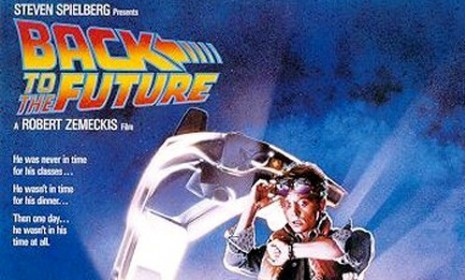Is China banning time-travel TV shows?
The communist power reportedly plans to do away with entertainment that messes with the space-time continuum — citing those shows' historical inaccuracy

A free daily email with the biggest news stories of the day – and the best features from TheWeek.com
You are now subscribed
Your newsletter sign-up was successful
The new thriller Source Code, in which Jake Gyllenhaal journeys into the past to prevent a bombing, probably wouldn't appeal to Chinese authorities. Apparently unhappy with the increasing number of television shows exploring time travel — and specifically, the artistic license those programs take with Chinese history — the country has banned such programs altogether. Does this mean the Chinese can never remake Back to the Future? Here's a brief guide to this puzzling decision:
What's the rationale here?
The General Bureau of Radio, Film and Television announced last week that it had seen enough credulity-straining plots involving flux capacitors and the space-time continuum. "The time-travel drama is becoming a hot theme for TV and films," the organization said in a (loosely translated) statement. "But its content and the exaggerated performance style are questionable. Many stories are totally made up and are made to strain for an effect of novelty. The producers and writers are treating the serious history in a frivolous way, which should by no means be encouraged anymore."
The Week
Escape your echo chamber. Get the facts behind the news, plus analysis from multiple perspectives.

Sign up for The Week's Free Newsletters
From our morning news briefing to a weekly Good News Newsletter, get the best of The Week delivered directly to your inbox.
From our morning news briefing to a weekly Good News Newsletter, get the best of The Week delivered directly to your inbox.
Is time travel really such a popular theme in China?
Yes. A number of popular time-travel television shows have hit the Chinese airwaves in recent years. These shows, says Andy Chalk at Escapist Magazine, are typically "fish-out-of-water tales about modern folk transported back to the past, where they must adjust to life without the everyday conveniences they've come to take for granted while finding true love and resolving some previously intractable historical brouhaha." Perhaps the most famous is Shen Hua (Myth), in which a young man is transported to the China of 2000 years ago, and links up with two famous military leaders from the country's Qin Dynasty. Critics have complained that the show, along with its many imitators, does not depict history accurately.
So this ban is for real?
The initial reports have raised some eyebrows. For one thing, the committee's decision was reached on April Fool's Day. There are also questions about the accuracy of the provided translation. "Reading more into this and looking at other translations, the 'time-travel' aspect may not be correct; rather it is the representation of historical characters that is becoming unacceptable," says Russ Fischer at Slash Film. But if it is true, says Mike Masnick at Tech Dirt, the question becomes, "How long will it take for people in China to create a video that involves going back in time to restock the General Bureau of Radio, Film and Television with people who seem less silly?"
A free daily email with the biggest news stories of the day – and the best features from TheWeek.com
Sources: China Hush, Tech Dirt, SlashFilm
-
 Film reviews: ‘Wuthering Heights,’ ‘Good Luck, Have Fun, Don’t Die,’ and ‘Sirat’
Film reviews: ‘Wuthering Heights,’ ‘Good Luck, Have Fun, Don’t Die,’ and ‘Sirat’Feature An inconvenient love torments a would-be couple, a gonzo time traveler seeks to save humanity from AI, and a father’s desperate search goes deeply sideways
-
 Political cartoons for February 16
Political cartoons for February 16Cartoons Monday’s political cartoons include President's Day, a valentine from the Epstein files, and more
-
 Regent Hong Kong: a tranquil haven with a prime waterfront spot
Regent Hong Kong: a tranquil haven with a prime waterfront spotThe Week Recommends The trendy hotel recently underwent an extensive two-year revamp